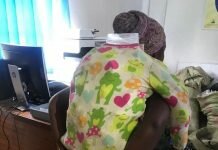
When the second person at the Uganda border town died after the virus outbreak spread from neighboring DRC, Bwera hospital for several hours couldn’t find a vehicle to take away the body.
“We don’t really have an isolation ward,” the Bwera Hospital‘s administrator, Pedson Buthalha, told The Associated Press. “It’s just a tent. To be honest, we can’t accommodate more than five people.”
Medical workers leading Uganda’s effort against Ebola lament what they call limited support in the days since infected members of a Congolese-Ugandan family showed up, one vomiting blood. Three have since died.
While Ugandan authorities praise the health workers as “heroes” and say they are prepared to contain the virus, some workers disagree, wondering where the millions of dollars spent on preparing for Ebola have gone if a hospital on the front line lacks basic supplies.
“Even the gloves are not enough,” the hospital administrator said Thursday. “I give them out small small.” A nurse nodded in agreement.
The World Health Organization on Friday said the Ebola outbreak is an “extraordinary event” of deep concern but does not yet merit being declared a global emergency . Such a declaration typically triggers more funding, resources and political attention. WHO said $54 million is needed to stop the outbreak.
They and some other contacts have since been quarantined in their homes. WHO says at least 98 such people have been identified in Uganda since the outbreak crossed the nearby border.
A nurse, who spoke on condition of anonymity to avoid possible retribution, questioned why some people who might have been exposed to Ebola are allowed to stay at home.
“I wish we could coordinate,” the hospital administrator said of the apparent confusion over how to manage the outbreak.
Ugandan Health Minister Jane Aceng told the AP on Saturday that district officials in Kasese were to blame for limited medical supplies after delaying in submitting their budget.
“It is clearly the responsibility of the district to order supplies,” she said. “If they haven’t done the orders we can’t supply because we don’t know how much they need.” As for upgrading the makeshift isolation ward in the hospital garden, she said “it is not economical. It is not cost-effective” to build permanent structures.
///AP















































